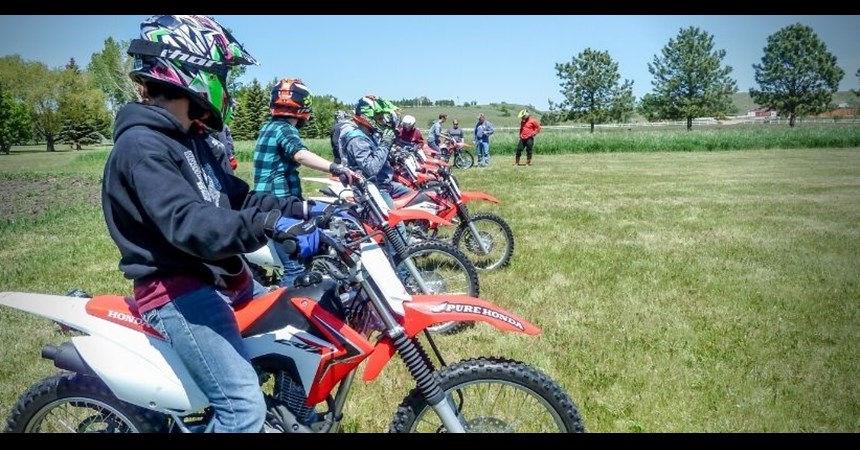By Maddie Harvala, Communications Intern
You might think putting at-risk youth and speedy mini-bikes together, then sending them riding on Ranch trails, is a dangerous combination. Yet that is exactly what Todd Fjeldahl, NYPUM Program Director at Dakota Boys and Girls Ranch, does.
NYPUM (National Youth Program Using Minibikes), a nationwide network of nearly 50 programs sponsored by the National Honda Motor Company, is an innovative way to engage at-risk youth. Throughout the United States, and at the Ranch, NYPUM has consistently proven to positively affect the youth participant's social, emotional, and psychological development.
The core idea of NYPUM is to put kids together with caring adults and a minibike, teaching them how to ride safely and care for the bikes, then giving them the opportunity to ride on off-road trails.
Ranch kids love NYPUM
Ranch kids ordinarily take their time warming up to activities and the people attached to them. That is not the case with NYPUM—children only one and a half weeks into the program have said things like, "I wish everyone could have a chance to do NYPUM. It's my favorite thing I've gotten to do at the Ranch." and "I'm saving up my money so that when I go home, I can buy a motorbike of my own." Most kids love the program instantly, which opens them up to develop positive relationships with Ranch staff. In addition to building relationships with staff, NYPUM helps kids connect to each other through a common experience.
In addition to the riding, children care for the equipment. Some take it very seriously. They take great pride in making sure the minibikes are properly maintained, and all the equipment is put back in its proper place.
One of the most important benefits of NYPUM, from Fjeldahl's perspective, is that it builds self-confidence. Some of the kids are afraid at first, but with practice, riding becomes like second nature—showing them they can learn and accomplish new things.
One child said, "You get to show yourself you can do things you never thought you could do."
Finally, NYPUM holds children accountable for their decisions. NYPUM ties the attractiveness of riding a motorbike to the progress they are making on their treatment goals. Kids earn 15 minutes of riding for every goal they meet. One of the goals must be education-related, and the other three are personal goals related to the child's individual circumstances; for instance, treatment, behavior, or family goals. The child and their team assess their goals each week to determine if they've been met and how long they can ride.
Safety First
The Ranch, and all NYPUM programs, take safety very seriously. All Ranch staff involved with the program complete instructor certification courses approved by the Motorcycle Safety Foundation, and are CPR and First Aid certified. The kids also complete 12 hours of comprehensive safety training before riding.
Before each ride, they inspect the bide using the TCLOCK procedure, which stands for Tires and wheels, Control levers, Lights and battery, Oil levels, Chassis, and Kickstand. The acronym helps kids remember to check all the functionality of the equipment before they start riding.
Participants must wear full safety gear—helmets, gloves, long sleeve shirts, long pants, and boots—and the Ranch maintains a three-to-one child-to-staff ratio during all NYPUM activities.
The NYPUM Triangle
Fjeldahl explained the idea of the NYPUM triangle. The first point of the triangle is the eager phase. When they start the program, children are willing to do anything and sign anything to get on the motorbike. Their primary focus is the thrilling freedom they anticipate when they step on the bike.
The second point of the triangle is when the children start focusing on more than just themselves. They begin to care for the bike and the program in more lasting ways, noticing the oil needs to be changed and helping trim trees so the trails are more accessible.
"The last point of the triangle is where it all comes together," Fjeldahl said.
In this last stage, participants develop meaningful relationships with staff and others in the program. Most importantly, they start transferring the experience into other areas of their lives. One child said, "The most important thing I learned through NYPUM is how to stay calm when you can't overcome something right away."
This article was originally published in Ranch Voice: Summer 2018.
Read more stories like this and explore other issues of Ranch Voice.

